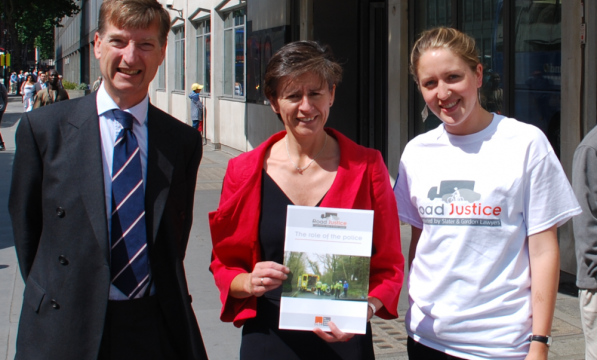ACPO to revise guidance on enforcement of 20 mph

This is a necessary move given that evidence presented at the APPCG 's Get Britain Cycling inquiry suggested that the Association of Chief Police Officers (ACPO) promotes a policy of not enforcing 20 mph speed limits.
In a letter to the APPCG following the inquiry, however, ACPO's road policing lead Suzette Davenport attempted to clarify the Association's position. She first stated that it was ‘incorrect to say that police officers are not enforcing 20 mph speed limits’, then went on to say that ‘20 mph zones should be self-enforcing’ through the use of traffic-calming features like speed bumps and traffic islands and that ‘there should be no expectation on the police to provide additional enforcement beyond their routine activity’.
Current guidance
ACPO's current guidance on the enforcement of 20 mph emphasises that local authorities should ensure there is sufficient signage and information to make the 20 mph limit obvious to visiting drivers, in order to reduce the need for police enforcement; and it advises the police to actively enforce the speed limit only where persistent high-harm speeding motorists are present.
In her letter, Ms Davenport also mentioned that Police and Crime Commissioners in England are responsible for setting strategic policing priorities for each police force and that they may include enforcement within local policing plans in areas where 20 mph zones are a local concern. It is possible that in its revised guidance ACPO will outline what kind of enforcement PCCs should ensure police forces use, although it is hard to see how this will diverge from the current guidance of only actively enforcing the limit where repeat offenders are present.
CTC welcomes yesterday’s announcement and waits with cautious interest to read the revised guidance.
In CTC's view, any driver caught far exceeding the 20 mph limit should be prosecuted for dangerous driving and the police should be generally more positive about the widespread introduction of 20 mph limits. CTC would also like more resources allocated to roads policing so that the police are able to adequately enforce speed limits.
Additionally, CTC believes there should be no margin over the speed limit at which a driver escapes penalty as such leeway gives drivers the impression that the speed limit is a target or minimum and undermines the status of the law.
ACPO should implement Road Justice recommendations
There is far more that ACPO could do to improve cycle safety beyond enforcing 20 mph: in particular, Ms Davenport should commit to working with Chief Constables to implement the recommendations made in the report - Road Justice: the role of the police. The recommendations cover the need for: thorough police investigations of road traffic collisions, adequate resources and training for roads police; and support for victims of road crime.
A petition calling on police forces across the country to implement these recommendations has already obtained 8,000 signatures and will be presented to ACPO in late October. Go to www.roadjustice.org.uk/police-petition to add your name.

